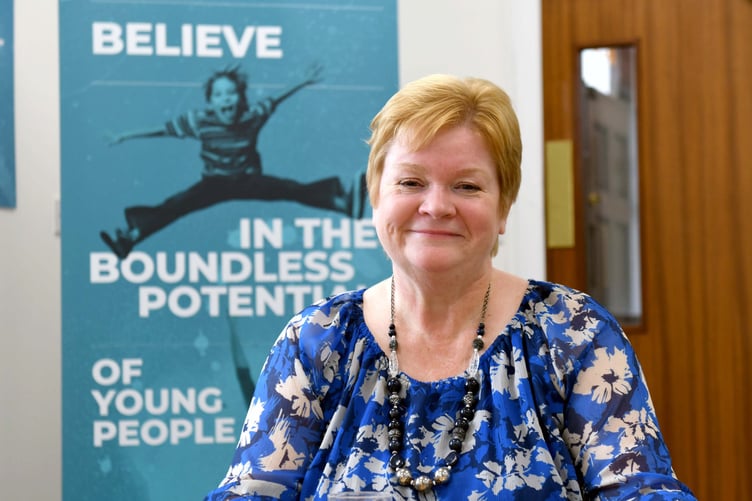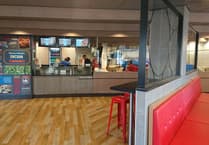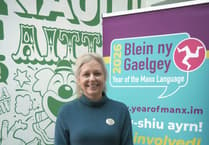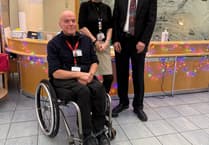I think we’ve got a duty to see that the young people that are coming out of education have got the best possible start in life by understanding the world of work.
‘We have a direct link to the economy as what we’re doing reduces youth unemployment – we’ve got the stats to prove that – but we’re creating entrepreneurs as well.’
That’s Sue Cook talking about the role Junior Achievement plays in developing a range of skills, not least the entrepreneurial ones, in our young people.
Sue, who is chief executive of Junior Achievement Isle of Man, has recently returned from a trip to Tallinn, in Estonia, with the Atlas team that won the island’s J A Company Programme and went on to compete in the European finals.
Their company sells sustainable soap tablets called H2sOap, which you can buy on their own or with one of the glass dispensers they also sell. The tablets dissolve in water, to create foaming hand soap, thus replacing single-use plastic bottles of hand soap.
Coming up against 40 other teams from all around Europe, they won three awards: the Bata Group Award for Group Good Governance, the SEB Environmental Sustainability Award and the City of Tallinn Excellence in Sales Award
Demonstrating their ability in the latter category, Sue says that the team were determined not to let anyone pass their stand without buying: ‘They took £600 in sales on the day and [one of the team] Mika even sold to the president of Estonia!’
Sue joined JA in 2009, having previously worked in youth training, in the north west of England, followed by 20 years in the recruitment industry both in the UK and as operations director for Hamblin on the Isle of Man.
She says: ‘I have lots and lots of knowledge about the employment market and that’s why I’m so passionate about what I do. I’ve interviewed so many young people and I can see that they’ve got that capability it just needs to be brought out in them.
‘And, if I’m truthful, before I joined Junior Achievement I was probably quite critical of schools not doing enough to educate our young people about the world of work but it really isn’t their job. They have to do all the academic skills, they don’t have the knowledge and the background in this industry, so JA complements the academic with the enterprise education.’
J A works with children starting from 10- to 11-yea-olds in primary school and going right through to 16- and 17-year-olds. Its programmes cover financial literacy and money management; soft skills such as teamwork and communication, and creativity and entrepreneurial skills. In all they will work with 4,500 to 5,000 children each year.
Sue pays tribute to the hundreds of volunteers who help to deliver the J A programmes on the island.
She says: ‘What makes us unique is we get volunteers from business and the wider community who donate their time to our charity and we train them on how to run these programmes.
‘Say we’re doing a financial programme and we’re talking about scams etc and we’ve got somebody from the financial sector, they bring that whole programme to life because they can relate it real life stories.
‘These volunteers are donating their time to learn our programmes, take them into schools, and then really use their life skills to make the whole thing come to life.
‘I firmly believe it’s who you meet that can make a difference: a volunteer can quite easily inspire a young person and what I really love is when I see the lights go on with somebody who’s not ordinarily engaged in education.’
In purely financial terms J A Isle of Man has estimated that the total contribution of their 300 volunteers is the equivalent of a donation of £120,000 a year. ‘That’s because a lot of them are high earners,’ says Sue.
‘The Department of Education Sport and Culture previously contributed £160,000 per annum to support the work of Junior Achievement. From the next academic year, this funding has been reduced to £80,000.
The Department has agreed to make this contribution for the next three years, which accounts for 25% of our annual budget.
‘It is important to secure alternative sources of funding to ensure there is no disruption to our work in schools.
‘If you would like to find out how you can help support our work please call 666266 or email [email protected].’Sue says: ‘The obvious response would be to cut the programmes that we’re doing but, if you think about this, we’ve had three years of no work experience, we’ve had lockdowns in schools, we’ve had students who’ve had no exams and now we’ve got a teachers’ pay dispute so we’re walking into a perfect storm and see it in the classrooms, we see that young people are struggling to engage.
‘We think there’s going to be a real problem in a few years’ time.’
Junior Achievement in Numbers
Set up in 1919 in the US, Junior Achievement now works in countries in Europe, Africa, Asia and the USA.
J A has set a target to reach 100,000 million students a year by 2050.
The organisation, which is a charity, has been nominated for a Nobel Peace Prize this year.
The Isle of Man is recognised as a member nation of J A in its own right.
On the island, J A works with secondary school children, an average of 4,500 to 5,000 each year, with 250 – 300 volunteers giving 3,000 hours to deliver the programmes.





Comments
This article has no comments yet. Be the first to leave a comment.